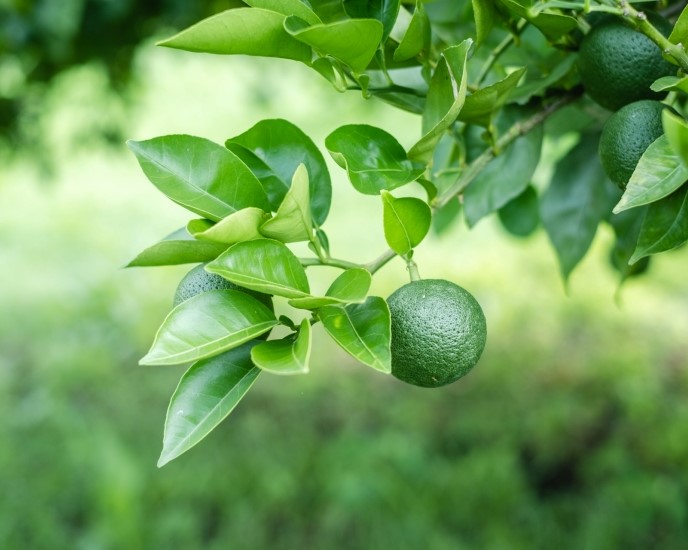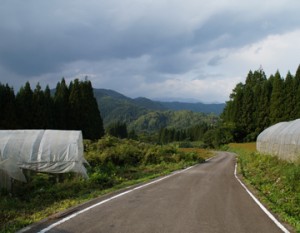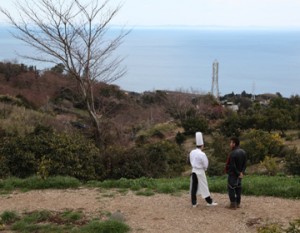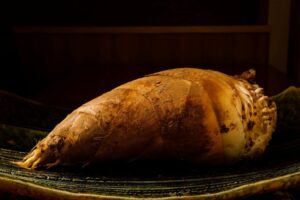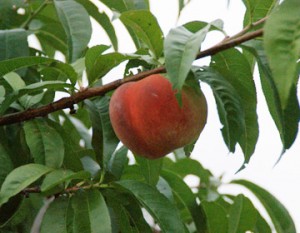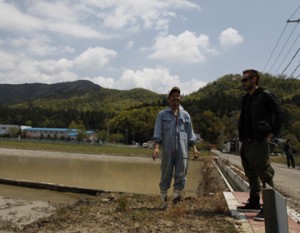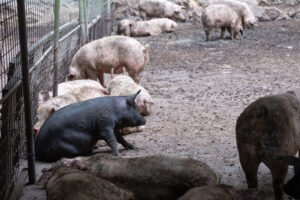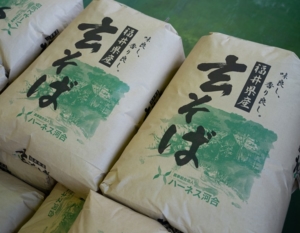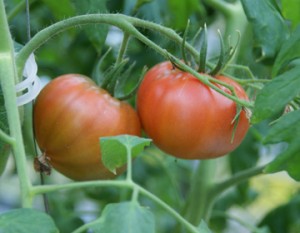Oita Prefecture accounts for 95% of all kabosu production in Japan. People in Oita Prefecture use kabosu not only with meat and fish, but also in miso soup, alcohol, and noodles. Kabosu, which plays a supporting role in enhancing the flavor of various ingredients, is an indispensable seasoning for the Oita dining table. The “Oita Organic Kabosu Farm,” located in Usuki City on the eastern edge of Oita Prefecture, continues to grow this specialty fruit tree organically, without using chemical fertilizers or pesticides.
To make people more aware of kabosu

Kabosu has a long history in Oita Prefecture. It is said that a doctor named Sogen brought back seedlings from Kyoto. Today, kabosu is cultivated throughout the prefecture, and in Usuki City, a famous production center, there is a 300-year-old kabosu tree. Even today, there are old trees around 200 years old scattered throughout the prefecture, which are not found in other prefectures.
Compared to other citrus fruits, kabosu is still not well known. That was the starting point of my business. This was the starting point for me to start my own business,” says Tsuyoshi Kunieda, who runs an organic kabosu farm in Oita.
Mr. Kunieda was a salaryman in Tokyo, but when he was 35 years old, he made a U-turn to his parents’ hometown in Oita. At first, he lived as a part-time farmer while helping his parents run a kabosu garden, but when he turned 50, he decided to take over his family’s farm when the department of the company he worked for closed down. At this turning point in his life, he wondered what he could do now, and what came to mind was kabosu, which had been close to him since he was a child.
The organic world where I had the courage to step into.
When Mr. Kunieda started his farm, he gradually expanded his farmland by renting land that had been abandoned for various reasons, including the aging of the farmers. Although kabosu cultivation had always been popular in Oita Prefecture, he was faced with the reality that it was not enough to make a living. He then turned his attention to “organic cultivation,” a method of growing kabosu. Since he had been involved in organic farming for some time, he thought it would be a good idea to ship the resulting kabosu to the Kanto region. The fact that there were no other organic growers in the area was also a big trigger for him.
“If no one else is doing it, let’s do it.”
Some people around him thought that it would be difficult to grow organic produce without pesticides, but he believed in himself and took on the challenge.
“JAS Organic” Certification. Efforts to Make the Impossible Possible

Normal cultivation also uses herbicides and synthetic fertilizers. In human terms, it is like putting an intravenous drip into your body. It took a long time and a lot of determination to suddenly switch to organic cultivation after having grown trees that way before.” The challenge of going organic was not easy. He started by feeding the trees with organic fertilizer and letting the soil bacteria in the soil absorb the decomposition to create strong, immune trees. He did not cut all the weeds in the field, but instead nurtured the soil bacteria, and by making the soil soft, the trees absorbed the nutrients and grew leaves and fruit. Mr. Kunieda repeats this cycle, cutting weeds regularly, feeding compost, and letting nature take care of the rest, and the organic farming method is completed. The trees that were so fragile when he first started organic farming are now, 15 years later, growing freely and spontaneously. Some of the trees are over 40 years old. Mr. Kunieda hopes that the trees will live as long as possible, repeating the process of pruning them every year to stimulate their metabolism and produce new buds. He visits the fields every day with great love and hope for the kabosu.

Mr. Kunieda arrived at the path of organic farming through repeated trial and error. Since organic cultivation requires more time and effort than conventional cultivation, including field management, and there was no precedent in the industry, Kunieda went through many days of trial-and-error. His efforts were recognized in 2011 when he was certified as “JAS Organic,” a national standard set by the Minister of Agriculture, Forestry, and Fisheries. This certification is given to foods produced by the power of nature without relying on chemical substances such as pesticides and chemical fertilizers, and Oita Organic Kabosu Farm is the only farm in Japan that is JAS certified for kabosu cultivation. Kunieda’s efforts to “do what no one else is doing” have borne fruit.
Difficulties in making a living from agriculture

For a while after he started organic farming, he had to struggle financially, but he paved the way with various innovations and ideas. With the recent increase in the number of organic-oriented people, the company has expanded its sales channels nationwide, including online sales, but things were not smooth from the beginning. Although the company has been expanding its sales channels nationwide through Internet sales, it was not smooth from the beginning,” said Mr. Kabosu. In addition, while agricultural cooperatives and markets set standards for the size of fruit and vegetables, many organic kabosu do not meet those standards because they do not use pesticides, so the company had to establish its own sales channels to make it viable.
He said, “It is not enough to make a living only by making products, but also by selling them. If you can’t make that mechanism work, you can’t make a living. I guess I was lucky. Mr. Kunieda smiles, but he is here today because of his efforts to develop sales channels while facing the Kabosu in the fields, rain or shine.
Both green and yellow. Love Kabosu in all its fullness.

Kabosu is in season twice a year,” says Mr. Kunieda.
The green kabosu, as it is commonly known, blooms in May and comes into season after the Bon festival in August. The green kabosu has a refreshing aroma, but from the end of October, it begins to turn yellow a little at a time, and is in season again around December. Commonly called “yellow kabosu,” it has more juice than summer kabosu, and its sweetness combined with moderate acidity makes it a perfect seasoning for winter nabe dishes and other dishes. Until about 15 years ago, yellow kabosu was thrown away because it was not attractive enough to sell. But we, the creators, knew how good it tasted, so we ate it ourselves.”

Oita Organic Kabosu Farm sells all of its kabosu, including yellow kabosu, as fruit and juice. Since the beginning of his farming career, Mr. Kunieda has been trying to change the current situation in which it is considered impossible to survive only by growing kabosu, so he decided to sell not only fruits and vegetables from August to December, but also fruit juice that can be sold year-round. He introduced a squeezer to produce a volume of juice that could not be achieved by manual labor up to that point. Bottles of 100% organic kabosu fruit juice are now being delivered throughout Japan.
Challenging the future with the potential of young people

With the aging of farmers in Oita Prefecture, the shortage of labor is a serious problem.
They also have to grow shiitake mushrooms, tobacco, and rice,” he said. Demand is there, but supply is not balanced, so it will continue to be important to secure the right staff.”
With young staff on board, the young people should be able to enjoy working and living in line with the times. Kunieda also hopes to create an environment where they can do what they love both publicly and privately. He also wants to create an organization that maximizes the talents and potential of young people, and is moving forward with an eye on the future. Mowing in the summer is very hard work, but I think it is good if there is joy in it,” he says. Cutting the grass gives us results and a tangible sense of satisfaction. I would be happy if all the staff could enjoy working together while cherishing that emotion.”
Most of the customers who seek Mr. Kunieda’s organic kabosu are repeat customers.
First of all, we have to let people know about our products. If they know how delicious it is, they will definitely come back.
Organic kabosu grown in Oita’s rich nature and with the love of Mr. Kunieda. The possibilities of organic kabosu, which is not only delicious but also safe and secure, are endlessly expanding.



